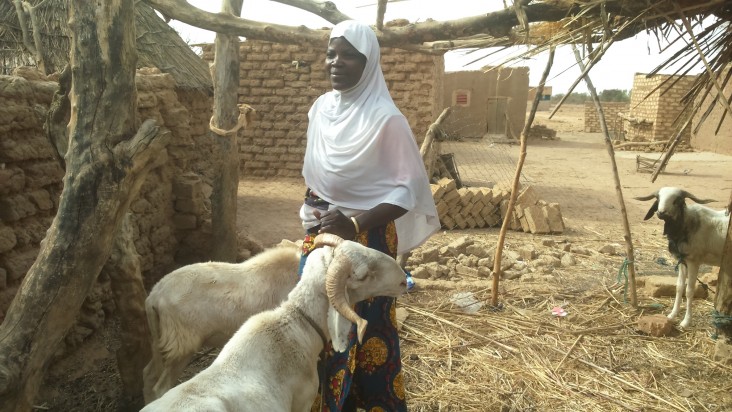Speeches Shim

A few years ago, Alimata Korogo, a hard-working mother of six, was struggling to make ends meet as a peanut farmer in the Centre-Nord region of Burkina Faso. She was chronically food insecure, illiterate, in poor health, and unable to escape indebtedness.
Chronic Vulnerability
In Burkina Faso, one of the poorest countries in the world, around 3.5 million people -- or 20 percent of the population -- are food insecure.
Because the country is prone to repeated crises, hardworking farmers like Alimata often see their modest assets or savings suddenly wiped out when events like drought or violent extremist attacks occur.
This fuels a pattern of poverty and vulnerability that many cannot escape.
Investing in Resilience
To break this terrible cycle, USAID is investing in the Sahel region, where Burkina Faso lies, to build people and community resilience.
By building resilience in Burkina Faso and neighboring countries in the Sahel, USAID’s efforts are designed to break this cycle of poverty and crises, and allow the conditions for development to take root.
In 2014, Alimata participated in a series of courses and training funded by USAID to learn about farming, home gardening, health, nutrition, and literacy. She was then put in charge of a farming group of 14 women with whom she shared the skills and knowledge received from USAID.
Thriving
“We were able to enrich our soil and get higher yields. I was even able to store tens of bags of cowpeas (a black-eyed pea variant) and sell them later at the market when prices were better,” she said last year, back in 2019.
Word of Alimata’s abilities quickly spread. Over the next three years, she worked with 57 farming groups in six nearby villages. Thirty-seven became formal cooperatives.
Her farming successes allowed her to invest in a soap-making business and branch out to the cultivation of different crops such as carrots, sorrel, and moringa.
In the first quarter of 2019, her team made a net profit of more than 800,000 CFA ($1,600).
"I was able to send four of my children and two of their step-siblings to school,” Alimata explains. “I could pay for clothing and health expenses for my family, I also bought myself a motorbike and built my own house.”
Disaster Strikes
Over the past few years, the security situation in the Sahel has steadily declined because of the widespread violence committed by armed extremist groups.
In 2019, unidentified armed men attacked the village next to Alimata’s home. Fearing for her life, she fled to a nearby town called Barsalgho along with her family and neighbors.
That day, Alimata lost almost everything, and like more than one million people in Burkina Faso, she became an internally displaced person, IDP for short.
Resilience at work
“After arriving in Barsalgho, the nearby town, I got in touch with the coaches still working with USAID and they provided much-needed advice and moral support,” she said.
“I used the savings I had put together to buy a piece of land and built a small house. Then I took a 5,000 CFA ($10) loan to start a cake and fried fish business. With the profits, I restarted making and selling soap.”
Alimata didn’t stop there. She bought two sheep and a hen which has already given her 20 chicks. She is also training 70 women in three groups on how to make soap, something that she does voluntarily to help her community rebuild itself.
Looking Ahead
“I plan to build a small house closer to the school so my children don’t have to spend so much time getting there and back. I also want to complete a French literacy program and get a good job with an organization involved in helping people, just like I was helped.”
Alimata and hundreds of thousands of other Burkinabés are not out of the woods yet. Climate change is exacerbating the intensity of natural disasters in the region and violent extremism remains a real threat.
The road ahead will be tough, but USAID stands along the way to help: more than a quarter-million people like Alimata have been trained in Niger and Burkina Faso. Their increased resilience is contributing to breaking the cycle of crises and poverty while paving the way for peace and development in the Sahel.
***
Between 2012 and 2018, USAID’s RISE project, a part of the Feed the Future initiative, helped individuals, communities, and governments in Burkina Faso and Niger to better manage crises, pursue a diverse range of job opportunities, feed their families, and invest in their futures. Building on these successes, the RISE-II project will be implemented until 2023 to pursue similar objects.
The 2013-2020 USAID REGIS-ER Project was designed to support sustainable livelihoods, strengthen governance, and improve health & nutrition in Burkina Faso.

Comment
Make a general inquiry or suggest an improvement.